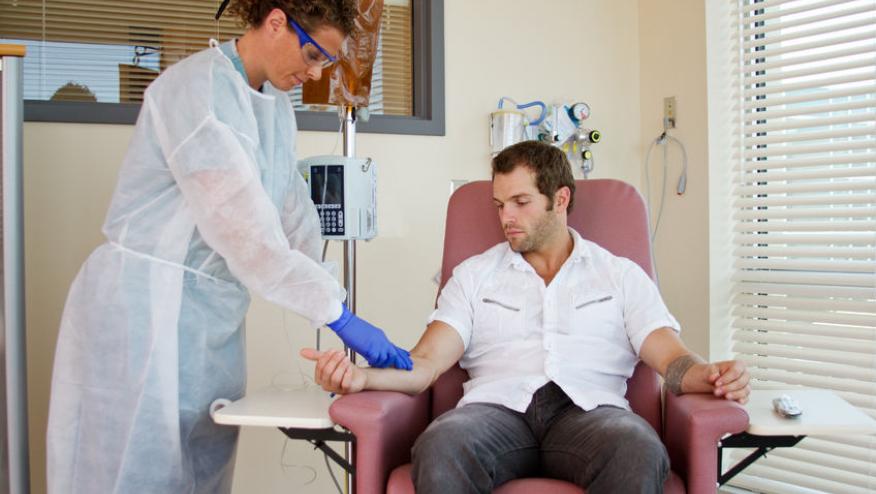Rituximab Safety Concerns when Used in anti-TNF Refractory RA Save

The SUNSTONE study evaluated the long‐term safety of rituximab in rheumatoid arthritis (RA) previously exposed to ≥1 anti–tumor necrosis factor inhibitors (TNFi) and showed a stable, but high, rate of serious infections, opportunistic infections and an overall higher mortality rate.
The SUNSTONE [Study of the Safety of Rituxan in Patients With Rheumatoid Arthritis After an Inadequate Response to Previous Anti‐TNF Therapy] registry) was a 5 year prospective, observational cohort study, of RA patients received rituximab. Although the primary outcomes were protocol‐defined significant infections, the study also examined other adverse events (AE) cardiovascular or thrombotic events, seizures, deaths, and pregnancies.
A total of 989 patients received ≥1 dose of rituximab for a mean of 3.9 years (3,844 patient‐years exposure). The frequency of significant infections (in 197 patients) was 19.9%. The incidence rates for for prespecified AEs, including significant infections, cardiovascular or thrombotic events, and seizures were:
- Infections 8.87 (95% CI 7.98–9.86) per 100 patient‐years
- Cardiovascular and Thrombotic events 1.95 (95% CI 1.56–2.45) per 100 patient‐years
- Seizures 0.18 (95% CI 0.09–0.38) per 100 patient‐years, respectively.
The incidence of significant infections did not increase with time or with cumulative rituximab exposure.
During the study, there were 64 deaths with a crude mortality rate 1.66 per 100 patient‐years and a [95% CI 1.30–2.13]) and an increase in the standardized mortality rate (1.58 per 100 patient‐years; 95% CI 1.22–2.01).. The most common causes of death were infections (n = 19), malignancy (n = 14), and cardiovascular events (n = 13). Eight pregnancies were reported in 7 patients.
Several items standout in this study - the higher than expected infection rate, SMR and the use of RTX in patients with prior maligancies.
The overall infection rate was 8.87 per 100 patient‐years and the serious infection (SIE) rate was 7.60 per 100 patient‐years. This is notable as the RA SIE rate in the prebiologic era was 3-9 SIE per 100 pt-years and the SIE rate of most current day biologics ranges from 2-5 SIE per 100 patient years. The SUNSTONE results are different than that seen in the RTX development trials was 2% or 4.31SIE per 100 PYs. THE SIE rate in a global, pooled clinical trial rituximab (n = 3,595) was 3.76 per 100 patient‐years and in the US‐based Corrona registry the RTX SIE was 1.6 per 100 patient‐years.
Opportunistic infections were also higher than expected in SUNSTONE compared with rituximab‐treated patients in the British Biologics register (BSRBR‐RA) (0.29 versus 0.15 per 100 patient‐years).
These inflated statistics are likely to have been influenced by the patients enrolled in SUNSTONE, all having failed multiple DMARDS and at least one TNFi. Such "refractory" patients have a much higher baseline risk of SIE and mortality that is likely to be further augmented by concomitant steroid use.
Lastly, 134 (13.5%) of enrolled patients had a history of past malignancy. There were an additional 17 new malignancies in 17 patients (1.7%) with the most common being lung cancer (n = 5), breast cancer (n = 2) and melanoma (n = 2). A history of malignancy, advanced age, and current or prior tobacco use risk factors for a new/incident malignancy. Of the 17 with a prior malignancy, a new or secondary malignancy was seen in 7 patients (41% recurrence rate).
These numbers provide no proof or protection or prescribing comfort for RA patients with a past malignancy. While the cancer recurrence rate is not not better than other biologics, it is not clearly worse; suggesting that there is no preferred biologic to use in those with a history of cancer.










If you are a health practitioner, you may Login/Register to comment.
Due to the nature of these comment forums, only health practitioners are allowed to comment at this time.